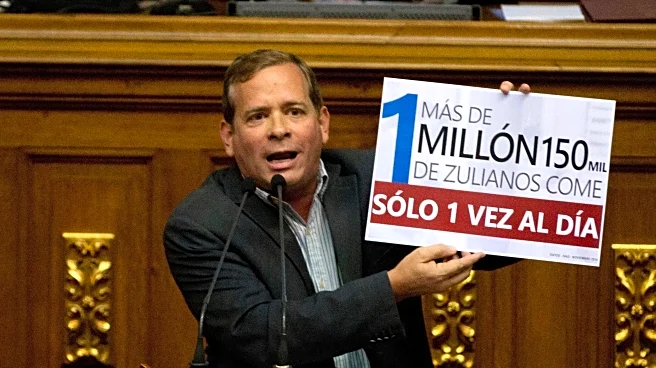What is the story about?
What's Happening?
President Trump has announced a new agreement with AstraZeneca to implement most-favored-nation pricing for American patients. This deal aims to align U.S. drug prices with the lowest prices paid by other developed nations. The agreement will allow State Medicaid programs to access these reduced prices, potentially saving hundreds of millions of dollars. AstraZeneca is required to repatriate increased foreign revenue from existing products due to the President's trade policies, benefiting American patients. Additionally, AstraZeneca will offer significant discounts on medicines sold directly to American patients. The deal is part of President Trump's broader initiative to reduce drug costs and ensure that foreign nations do not benefit from American pharmaceutical innovation at the expense of U.S. consumers.
Why It's Important?
This agreement is significant as it addresses the issue of high drug prices in the United States, which are often much higher than those in other developed countries. By securing lower prices, the deal aims to alleviate the financial burden on American patients, particularly those suffering from chronic conditions like asthma and COPD. The initiative also seeks to end the practice of foreign nations benefiting from American pharmaceutical innovation without contributing to its costs. This could lead to a more balanced global pricing system and potentially stimulate domestic pharmaceutical manufacturing and research, as evidenced by AstraZeneca's planned $50 billion investment in U.S. facilities.
What's Next?
AstraZeneca plans to invest $50 billion in U.S. manufacturing and research by 2030, including the construction of a new facility in Charlottesville, Virginia. This facility will produce advanced pharmaceutical ingredients and create 3,600 skilled jobs. The broader implications of this deal may include increased pressure on other pharmaceutical companies to follow suit and offer similar pricing models. Additionally, the U.S. government may continue to negotiate similar agreements to further reduce drug costs and strengthen domestic pharmaceutical supply chains.
Beyond the Headlines
The deal highlights ethical considerations regarding global pharmaceutical pricing and the role of American innovation in subsidizing foreign healthcare systems. It raises questions about the fairness of current pricing models and the responsibility of pharmaceutical companies to ensure equitable access to medicines. Long-term, this could lead to shifts in international trade policies and healthcare strategies, as countries reassess their reliance on American pharmaceutical products.

















